From 23rd July 2017 to 15th October 2017, the UK's National LGBT survey is open, “to understand the experiences of lesbian, gay, bisexual or transgender (LGBT) people living in the UK”.
I've (only just) completed the survey. I took screenshots of each page as I went. I won't include all of them here, but rather just focus on a few interesting areas.
While the survey is anonymous and private, in this article I have chosen to, directly or otherwise, reveal my responses to some of the questions.
Survey length and accessibility
“The survey should take around 15 minutes to complete”. Maybe not such a bad estimate actually; I was taking screenshots, which took extra time, and for me the survey took about 30 minutes. Your mileage may vary, depending on all sorts of factors, including the answers you give (it's a branching survey, where the questions you are presented with vary depending on your previous responses).
The survey did seem like it was probably quite good on accessibility. Simple HTML, lightweight pages, no sound or animation, clear text, standard use of form inputs. Every page included a percentage bar, indicating approximate progress through the survey. Depending on the screen size, you may or may not get an option allowing you to step backwards as well as forwards.
Every question included a “Prefer not to say” option, though some questions were impossible (for me) to answer correctly and without being misleading.
The questions
Identity
The gender (or as they phrase it, “gender identity”) question. “Transwoman” and “transman” are not my preferred terms, and it's interesting that both “Woman” and “Transwoman [sic]” were listed (and you couldn't pick more than one). But on the plus side, there's an option for “other (please specify)”.
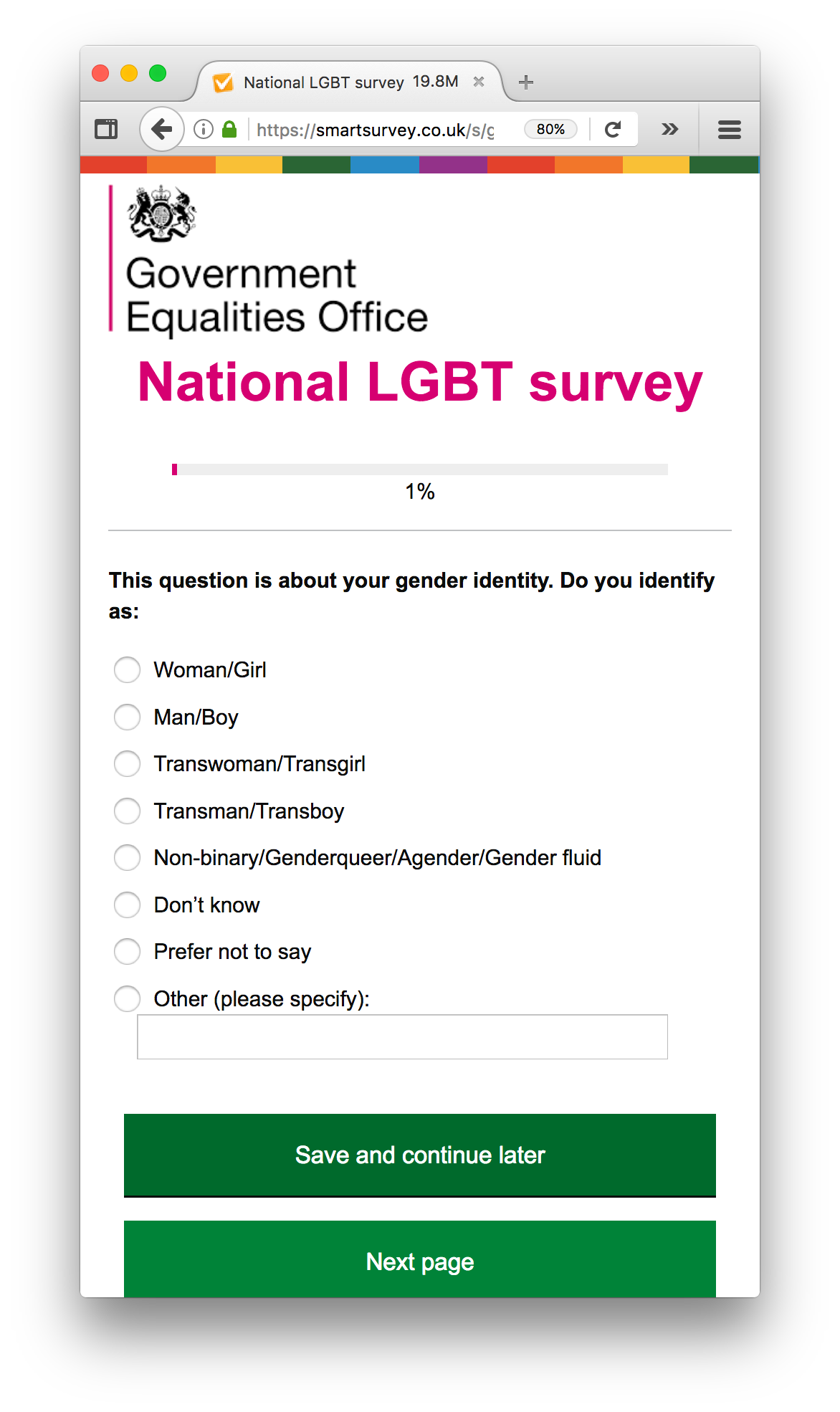
There are questions about age, gender, intersex, sexuality, relationship status; but interestingly there was no specific question about trans status.
But wait: there's something interesting going on here. If you answer either “Woman/Girl” or “Man/Boy”, you get an extra question: “What was your assigned sex at birth?”; and thus by combining your responses to these two questions, the survey works out whether or not you're trans. Whereas if you select one of the other responses (including “Other (please specify)”), you don't get that extra question; it appears the survey just assumes that you must be trans.
Amusingly this means that selecting the preset option “Woman/Girl” (ditto “Man/Boy”) gives a different behaviour from choosing “Other” and then typing in that exact same text. In other words: if you're awkward enough to choose “other”, you must be trans. 😜
Living in the UK
Various questions about experiences of life as LGBT. Example: “Do you ever avoid holding hands in public with a same-sex partner for fear of a negative reaction from others?”. Well, “ever” is a long time, so … (The available responses were: Yes, No, Does not apply to me, Prefer not to say).
I found this one interesting: “Where do you avoid being open about your sexual orientation for fear of a negative reaction from others?”, with the responses categorised as “Home”, “Workplace”, “Public transport”, etc.:
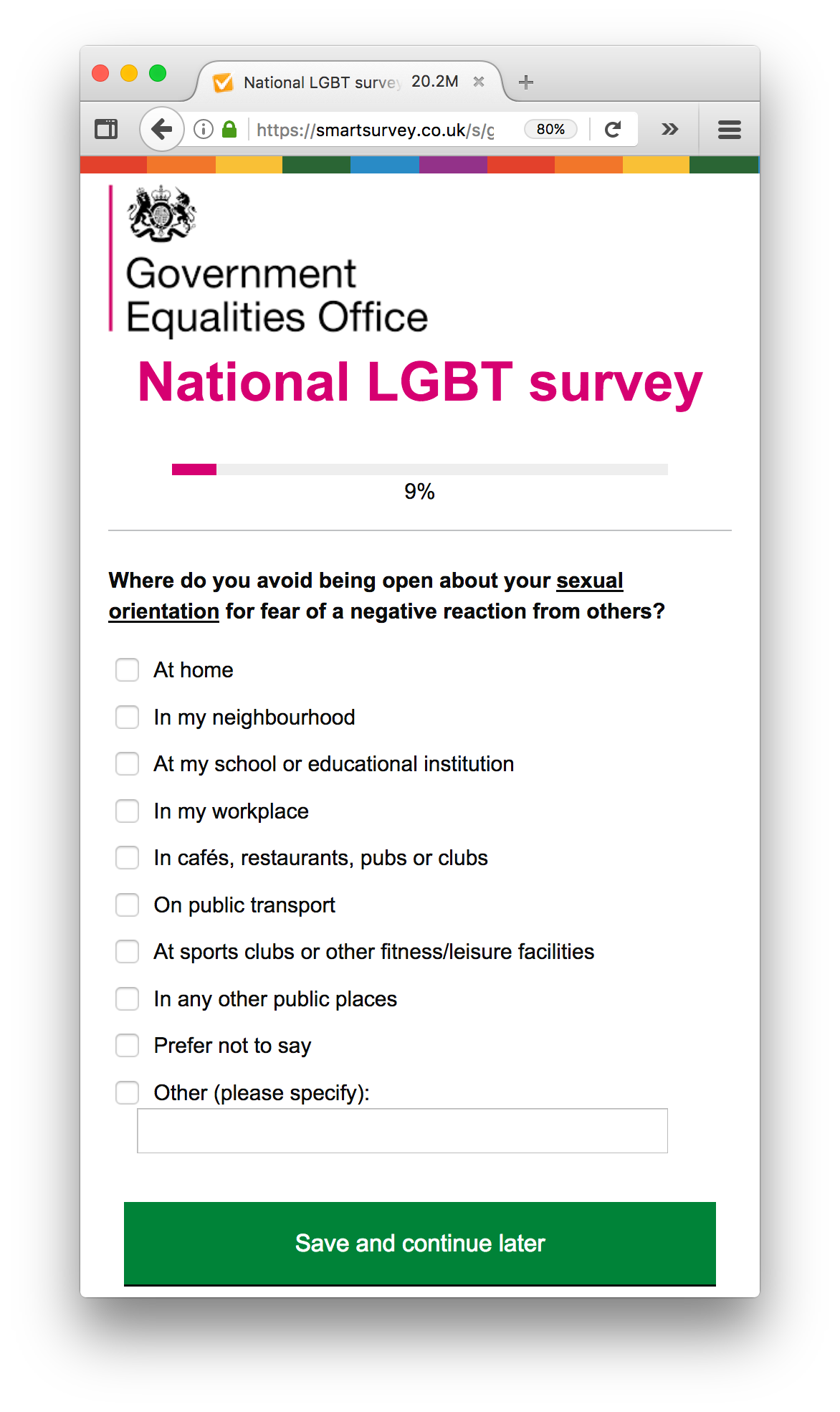
I opted for “other” because the answer for me is just “Well, it depends”. It's not like it's always a yes in these places, but a no in those others. But maybe it is for you, of course.
Here's a fun one: “Do you ever avoid expressing your gender identity for fear of a negative reaction from others?”:
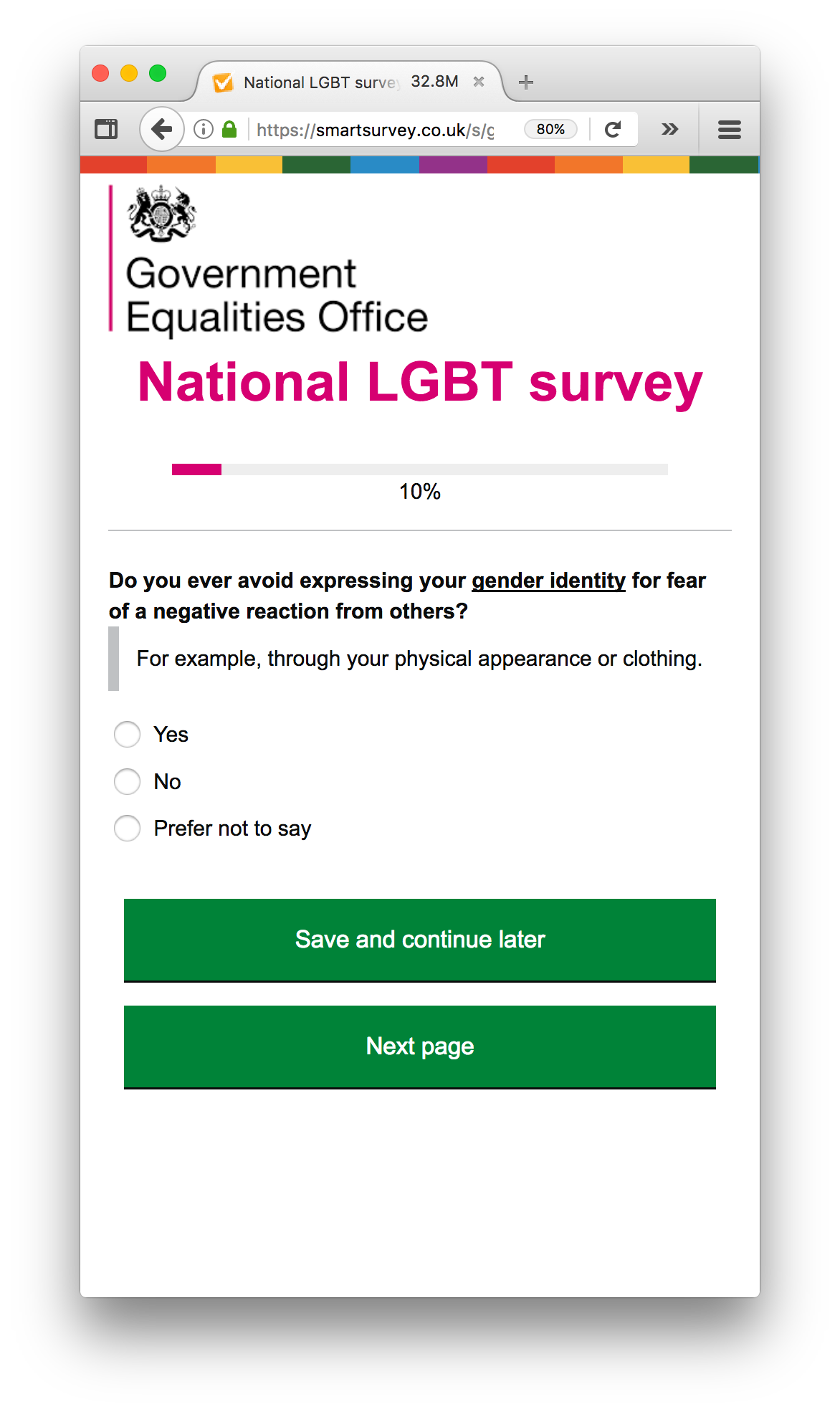
Correct response for me, as a trans woman: I sometimes avoid not expressing my gender identity! If I dress too stereotypically masc / androgynously (e.g. a big grey/blue/black baggy jumper and jeans), I fear that this increases the chance of misgendering, which obviously I want to avoid.
The GRC
WELL. This is where it gets interesting.
“Which of the following, if any, do you think are requirements of the UK's legal gender recognition process?”.
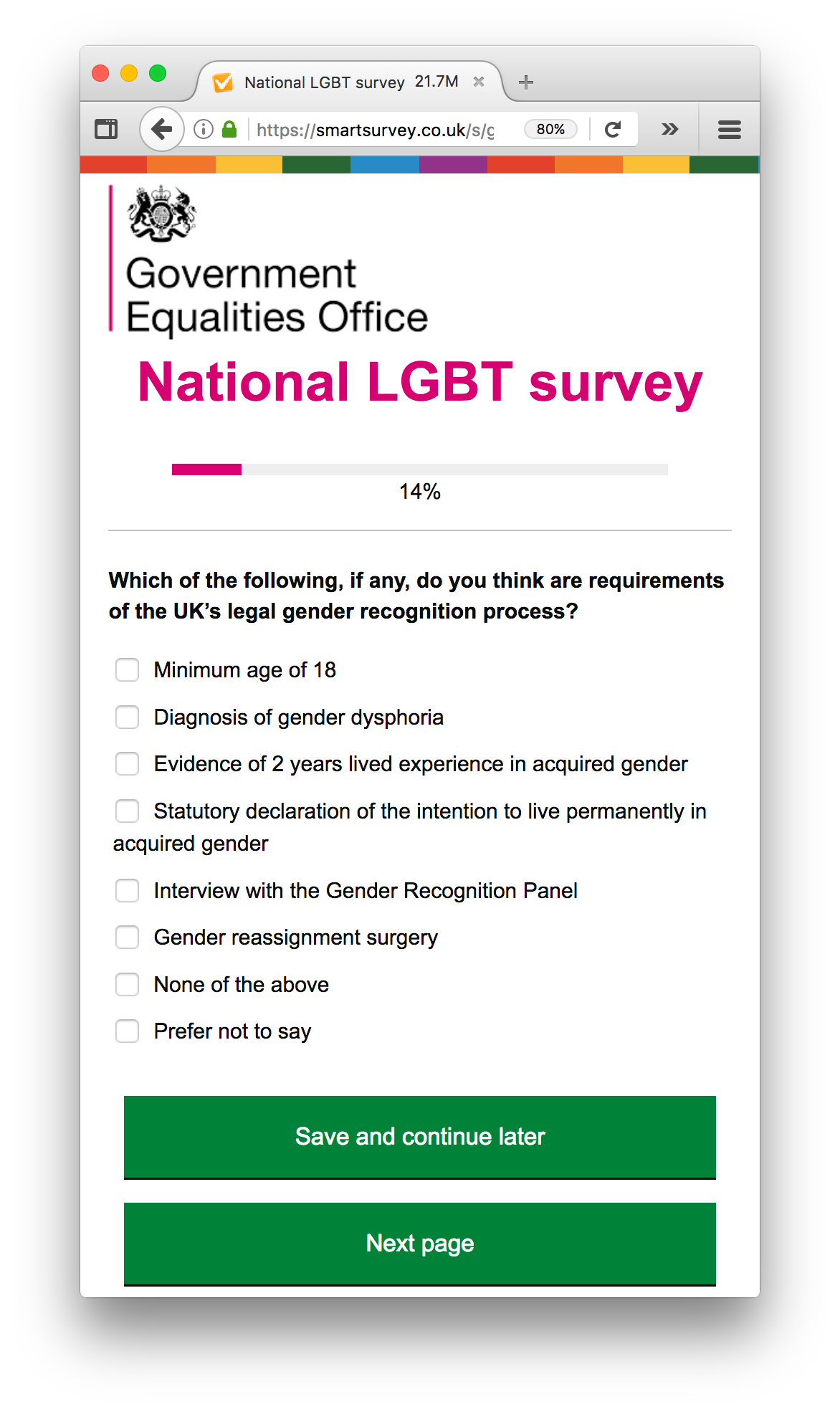
Now, I'll be honest, I'm not sure of the correct answers; but that's not my problem with this question. My problem is that I reckon even the faceless GRC bureaucrats who administer the process and would pass judgement on us aren't sure what the requirements are. I have no faith whatsoever that the criteria are applied fairly, to say nothing of whether or not I think the criteria are fair or just in the first place.
Note the language on the form by the way: “Gender reassignment surgery”. “Reassignment”, ugh.
Education, Work, Healthcare
“How understanding were your teachers and other staff of issues facing transgender, gender fluid and non-binary pupils in general?”. Well for me my school days were 1978–1991 (or -1994 if you include university), and I didn't identify as LGBT at the time, so I wasn't really paying attention to LGBT matters. But it being the era that it was, and remembering what I do remember about homophobia at the time, I'm taking a wild guess that the answer to the question would have been “Not at all understanding”.
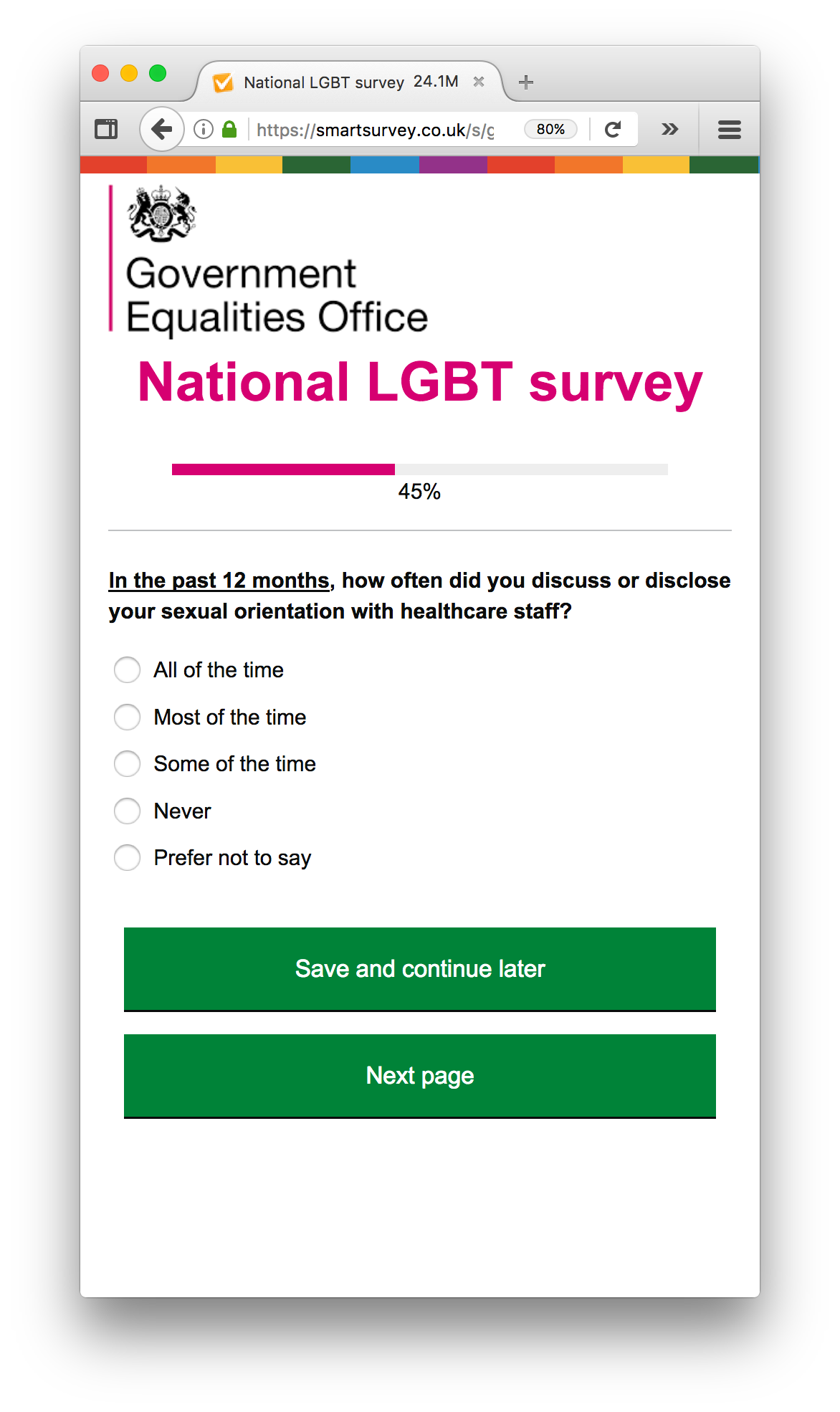
“In the past 12 months, how often did you discuss or disclose your sexual orientation with healthcare staff?”. This topic never came up for discussion, but as for disclosure … well my wife was often with me at appointments, so I suppose that's a form of disclosure?
There's also an interesting mismatch here in terms of a series of questions about sexual orientation:
- “How often did you discuss or disclose your sexual orientation with healthcare staff?”;
- “Did being open about your sexual orientation with healthcare staff have an effect on your care?”;
- “Why did you not discuss your sexual orientation with all healthcare staff?” (question seems kind of passive-aggressive, but there is at least an option for “It was not relevant”);
- “Did you experience any of the following [various things] when using or trying to access healthcare services because of your sexual orientation?”
vs a single question about gender identity:
- “Did you experience any of the following [various things] when using or trying to access healthcare services because of your transgender status or gender identity?”
Note the omission of the corresponding questions about disclosure, effect on care, and reasons for non-disclosure. Why the omission? Is there an assumption that we always disclose? That we need to disclose? Curious.
The GIC
“In the past 12 months, did you access, or try to access, any specialist gender identity services in the UK for support in relation to your gender identity? (for example, a Gender Identity Clinic)”. Options: yes (successful), yes (unsuccessful), no, prefer not to say.
Well… define “success”. Is referral alone success? Or do I have to actually get an appointment? Do I have to attend that appointment (as opposed to if I'm still waiting)? What if I got the appointment, but had to wait longer than the legal maximum of 18 weeks — is it “success” if I managed to access the service, but so slowly as to be illegal?
“On a scale of 1 to 5, how easy was it for you to access specialist gender identity services in the last 12 months?”. Again, define “access”, and define “easy”. If I am referred and join a queue, and I'm still waiting, have I accessed the service or not? (I guess not). OK, let's try another: if I was referred, waited an incredibly long time for my appointment, then got that appointment and was finally seen … and all I had to do was wait an incredibly long time … is that easy, or not?
I think many trans people seeking to transition, would disagree that waiting is easy.
Here's an interesting pair of gaps in the survey:
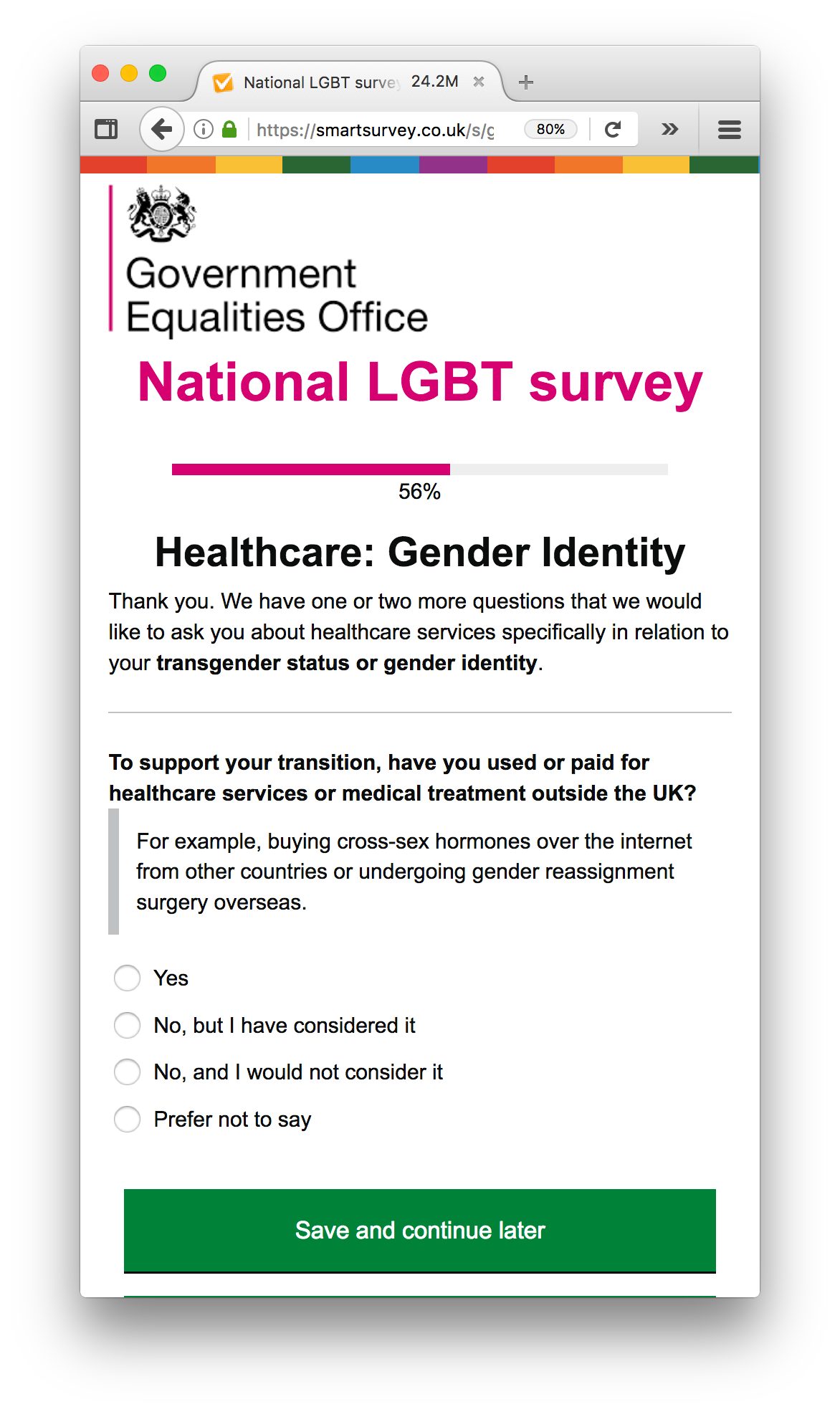
“To support your transition, have you used or paid for healthcare services or medical treatment outside the UK?”. Gap #1: there's no question about “going private” for trans healthcare within the UK; and gap #2, the allowed responses to that question are “Yes”, “No, but I have considered it”, “No, and I would not consider it”, and “Prefer not to say”. Missing option: “No, I did not consider it in the past, but I would consider it in future”.
At home / Outside the home
There's a series of questions about acceptance, discrimination, domestic violence etc. at home, and in general public life, including “street harassment”.
After a series of questions about incidents of harassment and so forth, there's this one (“Why did you not report this most serious incident to the police?”), which I will present without further comment:
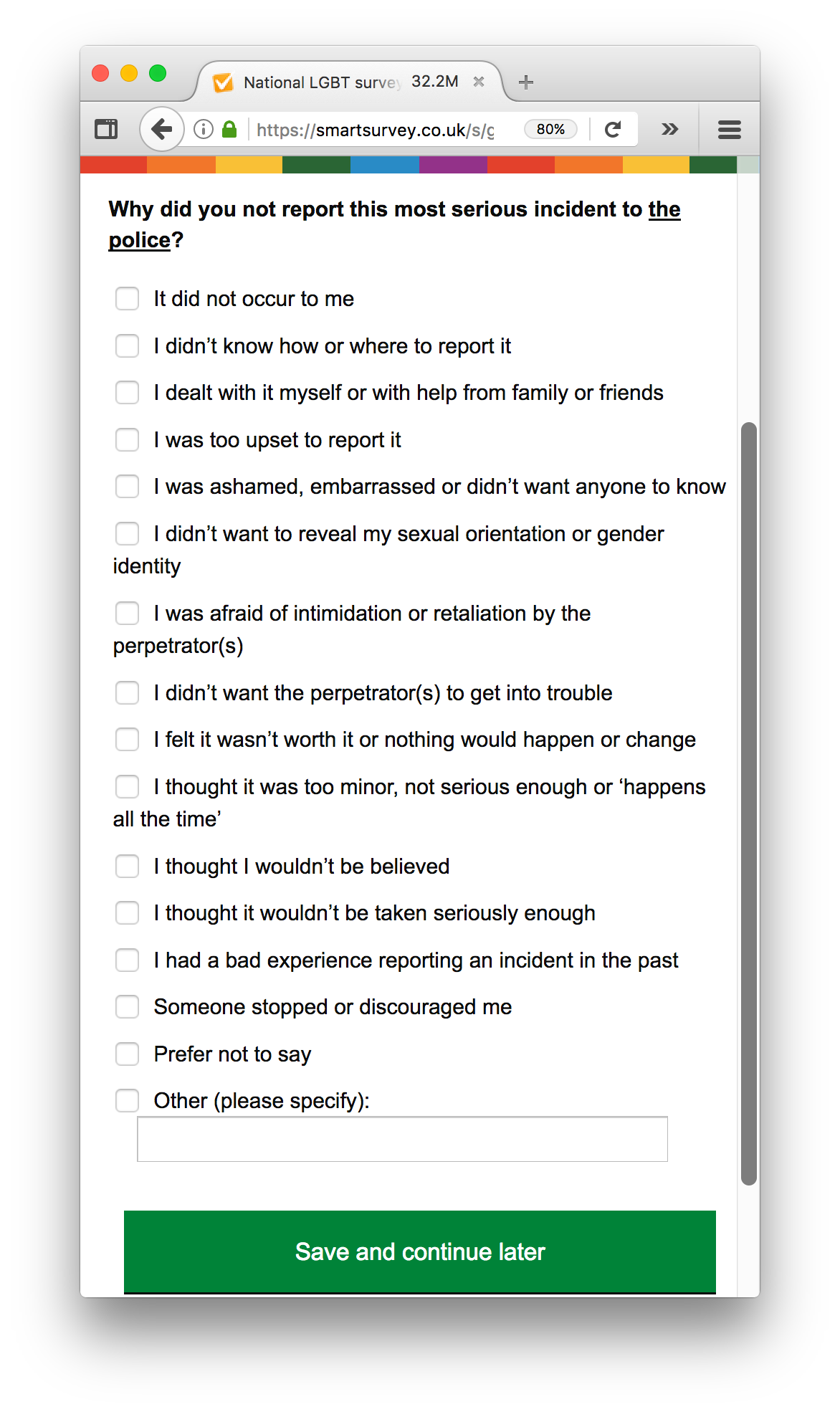
Other experiences
Questions on non-consensual sharing of sexual images of you, and on “reparative” therapy. Unpleasant subjects, but that's the point: I'm glad these questions are being asked.
Near the end: “Overall, on a scale of 1 to 10, how satisifed are you with your life nowadays?”. Discuss!
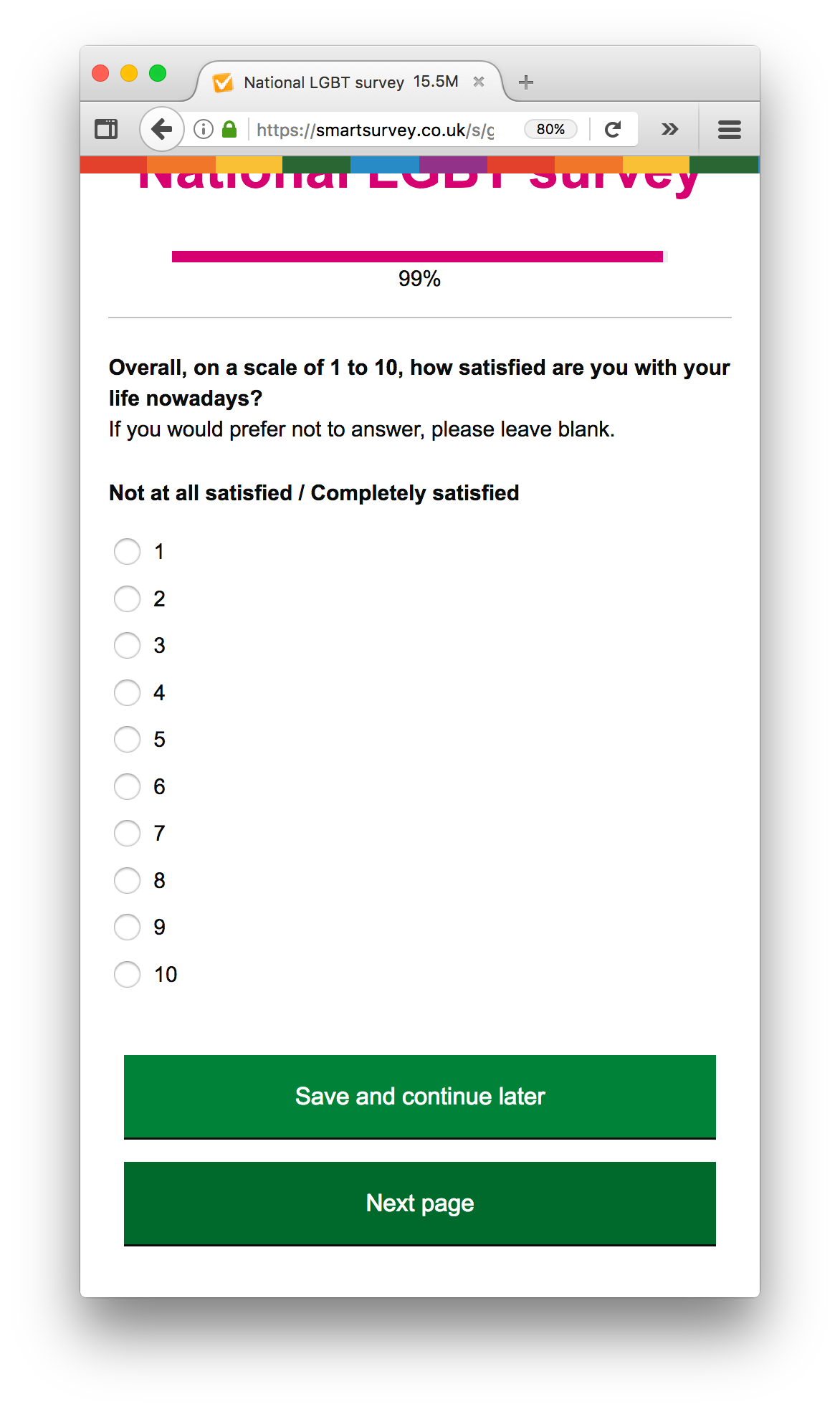
Notable omissions
Although there was a brief question about reporting (or rather, non-reporting) of incidents to the police, there were no questions that I saw of relating to other interactions with the police, the courts, or the prison system — and given the well-known problems with trans people and the prison system, this is a worrying omission.
In my survey I was asked questions about my experiences at work, but it's a branching survey, and therefore hard to see all the options; I wonder if the survey has questions relating to discrimination in hiring and firing, for example. Finally, I didn't see anything at all to do with housing.
Image source: the National LGBT survey